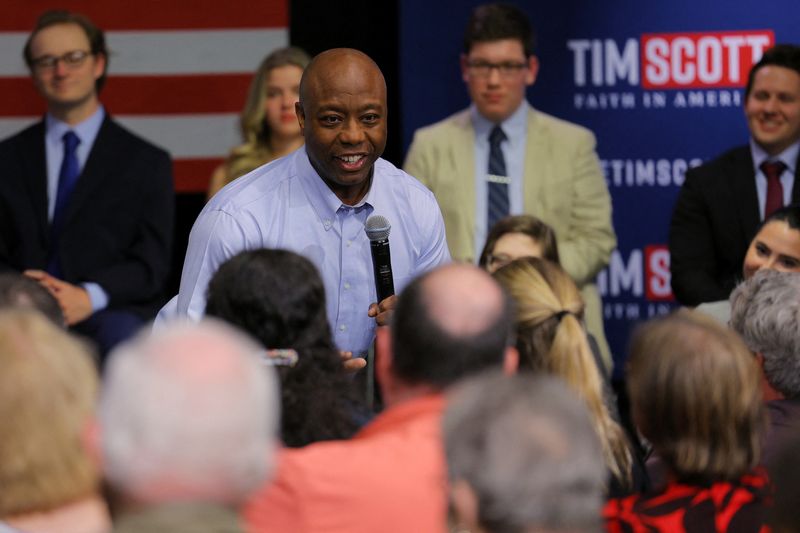By Moira Warburton
WASHINGTON (Reuters) - U.S. Senator Tim Scott on Friday launched a bid for the 2024 Republican presidential nomination. He is the only Black Republican candidate so far, and says he is running as an antidote to racial and cultural divisiveness in the United States.
Here are key facts about Scott's life and career.
RAISED BY SINGLE MOTHER
Scott, 57, was raised in Charleston, South Carolina, by his single mother, after his parents separated when he was seven.
The family briefly lived with his maternal grandparents, who became major influences for him. His grandfather left school after the third grade to pick cotton, and Scott frequently describes himself as an embodiment of the American dream by "going from cotton to Congress in one lifetime."
He graduated from Charleston Southern University in political science, and worked as an insurance agent and financial adviser before entering local politics in 1995.
STATE POLITICIAN
Scott was elected to the South Carolina statehouse in 2009, and to the U.S. House of Representatives in 2011. In 2012, former South Carolina Governor Nikki Haley - now a rival for the Republican presidential nomination - appointed him to replace retiring U.S. Senator Jim DeMint.
"To every single mom who struggles to make ends meet, who wonders if her efforts are in vain, they are not," Scott said at his appointment.
BLACK REPUBLICAN SOUTHERNER
Scott declined an invitation to join the Congressional Black Caucus in 2010 when he was serving in the U.S. House.
"My campaign was never about race," he said at the time.
However race is a difficult subject for him to avoid, particularly as he is the first Black Republican from the South in the U.S. Senate since 1881.
"I have experienced the pain of discrimination," he said in a 2021 speech, but added that "America is not a racist country."
He has both championed bills reforming policing in the United States, and declined to support bills intended to protect voting rights.
"I'm not here to suggest that things could not get better and I'm going to work every single day to make sure that all Americans play on a level playing field," Scott said at a Black History Month dinner in February. "But today is not 1865 ... We have made tremendous progress, and it's time that we as a people celebrate the progress we are making."
COMPLICATED RELATIONSHIP WITH TRUMP

Scott has largely managed to avoid drawing the ire of Donald Trump, despite occasionally offering some criticism of the former president.
After Trump in 2017 said there were "very fine people on both sides" of a white nationalist rally in Charlottesville that ended with a woman killed by a motorist, Scott said he had "compromised his moral authority to lead."